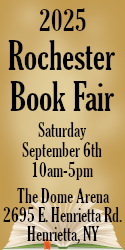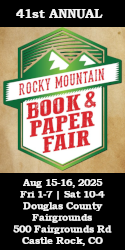Abigail & John
The rural village, on the outskirts of which we live, has much to recommend it. An excellent library, a number of dynamic book discussion groups, a college-owned theatre which hosts both college-sponsored and professional theatre productions, several annual jazz concerts and festivals, a well-appointed but struggling bookstore, at least three art galleries, more than that number of antique shops, and summer evening pop/rock concerts by the lake – all in an attractive setting at the edge of a small lake in central New York.
The somewhat informal book club I belong to is a spin-off from and a continuation of a foreign policy discussion group that meets during the winter months. Book club selections (borrowed from the library or bought new or used at nearby bookshops) tend to be history and/or public policy related – i.e. biographies, memoirs, international relations, political or social policy and the like – all of which tends to make for interesting and rather lively discussion.
David McCullough’s John Adams (New York, Simon & Schuster, [2001]) was the first selection for our spring session and a marvelous choice it was. Many of us grew up with received notions, ideas and prejudices about the natures and characters of our founding fathers and mothers and in the case of John and Abigail Adams my perception has been altered considerably.
Although McCullough’s biography rests upon the solid foundation described in the 24-page bibliography of manuscript collections, books, periodical articles, newspapers and journals, I believe it is his extensive use of direct quotations from their diaries and letters that bring freshness, life and a new perspective to the overall narrative. For this, author and reader alike are indebted to The Adams Family Papers housed in the Massachusetts Historical Society and the printed diaries and collections of correspondence edited by Lyman H. Butterfield and published by Harvard University Press in the 1960s. Because circumstances of public life kept John and Abigail apart for great periods of time, and because they wrote letters to each other almost daily, their surviving correspondence brings them to life as little else can.
In McCullough’s book we also learn about Adams’ colleagues and contemporaries. In a scene suitable for a Monty Python sketch, Adams and Franklin, along with a small delegation from the new Congress, are journeying to Staten Island to meet Lord Richard Howe who hopes to persuade them to renounce the recent Declaration of Independence. Stopping over in New Brunswick they stay in a small inn so crowded that Adams and Franklin “had to share the same bed in a tiny room with only one small window.” Before turning in Adams closes the window to keep out the night air, but Franklin, objecting, opens it, fearing they would suffocate in such close quarters. Lying side-by-side, debating the question of open versus closed windows, Franklin quotes extensively from his published theories on the health benefits of fresh air at night. Adams is tired and eventually gives in as Franklin continues to expound “upon air and cold and respiration and perspiration, with which I was so much amused that I soon fell asleep.”
About two years later Adams and Arthur Lee join Franklin as American commissioners to France, and Adams, at first feeling handicapped by his lack of French language skills, goes to the bookstalls and buys everything he can to help remedy the deficit. Within a short time Adams (always known as a hard worker and a quick study) becomes quite proficient and fluent to the point that he realizes how little French Franklin actually knew.
Whenever possible, Adams worked on his French, preferring the quiet early morning, before Franklin was stirring. With lists of recommended books – French dictionaries, grammars, works of literature, histories of diplomacy – he went to one Paris bookseller after another until he had them all, and more. And as often as he could, he attended the theater, usually taking John Quincy with him,
Franklin’s charismatic charm, interestingly, seemed to be based on his willingness to listen rather than talk. “Never verbose in social gatherings even in his own language, ‘the good doctor’ sat in the salons of Paris, looking on benevolently, a glass of champagne in hand, rarely saying anything. When he did speak in French, he was, one official told Adams, almost impossible to understand.”
The image of Thomas Jefferson is somewhat more complex. While Adams was a frugal New Englander who made it a point never to live beyond his means, even boarding with friends in Philadelphia while Vice President rather than go into debt in order to live in grander style, Jefferson was the quintessential big spending shopoholic. Whether on assignment at home or abroad or refurbishing Monticello, Jefferson would spare no expense in furnishing his living quarters, even when it was only temporary. In debt to moneylenders for most of his life, Jefferson depended on slavery to support his lavish lifestyle and although Adams would sometimes needle him about the ideological inconsistency of his remaining a slave-owner, Jefferson, agreeing, would simply plead economic necessity. And when his daughter Patsy (Martha) married Thomas Randolph, Jr., Jefferson gave “the young couple 1,000 acres and twelve families of slaves, and helped in the eventual purchase of a nearby plantation for them called Edgehill – all of which necessitated an additional loan of several thousand dollars, this time from bankers in Amsterdam.”
Upon his death on July 4, 1826, (the same day that Adams died), his property was sold to help pay off debts – “In January 1827 on the front lawn of Monticello, 130 of Jefferson’s slaves were sold at auction, along with furniture and farm equipment. Finally, in 1831, after years of standing idle, Monticello, too, was sold for a fraction of what it had cost.”
Arthur Lee, who joined Franklin and Adams as one of the commissioners to the court of France, was among the first, along with Thomas Paine, to accuse Silas Deane of accepting what amounted to large bribes from French contractors anxious to profit by selling military equipment and supplies to the new American government. According to Paine, Deane agreed to approve the inflated invoices (with resulting overpayment) for the goods purchased, thus enriching everyone involved. Lee, who had the ear of Adams, strongly suggested that even Franklin was involved in the scheme. Adams had always idolized Franklin (until years later) and must have found Lee’s accusations hard to accept.
Adams’ detractors have portrayed him as being somewhat aloof, bombastic, and a closet monarchist. He definitely was a Federalist in the sense that he believed in a strong and viable central government, but I’ve never read anything to confirm that he had monarchist sympathies (along with many others he had a personal liking for Louis XVI and was appalled when Louis and members of his family were summarily beheaded during the early stages of the Reign of Terror).
Adams all but gave up a growing law career in favor of dedicated service to the new country he helped to mid-wife. In 1777 he writes:
It was my intention to decline the next elections, and return to my practise at the bar. I had been four years in Congress, left my accounts in very loose condition. My debtors were failing, the paper money was depreciating. I was daily losing the fruits of seventeen years’ industry. My family was living on my past acquisitions which were very moderate… My children were growing up without my care in their education, and all my emoluments as a member of Congress for four years had not been sufficient to pay a laboring man on a farm.
Abigail, with the help of hired hands, was somehow able to keep the farm going during his prolonged absences and when John did return home, from time to time, he worked along with everyone else – one of his favorite chores, apparently, was helping to build and maintain the farm’s stone walls and fences.
Early in the Adams presidency, before Abigail was able to travel to Philadelphia, she had to deal with a number of family and farm-related crises. One such involved the education of the youngest of her hired hands, James Prince, who asked if he could attend classes in town at a new school for apprentices. Since Abigail had already taught him to read and write, she liked the idea very much and encouraged him to enroll. Shortly afterwards neighbors told her the other students would essentially boycott the school, if a black boy were admitted to class, and that she should seriously reconsider. With typical Adams feistiness, Abigail has words with the instructors and asks that the other boys be sent to her whereupon, as recounted in a letter to John, she gives them a late 18th century lesson in civil rights. “The boy is a freeman as much as any of the young men, and merely because his face is black is he to be denied instruction? How is he to be qualified to procure a livelihood? Is this the Christian principle of doing unto others as we would have others to [sic] do to us”? And so forth. As you might guess, Abigail blows away any opposition and James remains in school.
To my mind John Adams’ success in avoiding war with France, at a time when French privateers were detaining or capturing American merchant ships suspected of trading with England, was one of the highlights of his presidency. The “High” Federalists led by Hamilton were pressing for the creation of a large standing army, while Adams advocated simply enhancing existing naval defenses including equipping the Constitution, Constellation, and the United States, the frigates built during Washington’s administration. The “wooden walls” of defense, in Adams’ phrase.
Charles Cotesworth Pinckney, John Marshall and Elbridge Gerry had been sent to Paris to negotiate a peace treaty with the French Directory and to seek an end to the depredations on American shipping. In a series of “Communications…from the Envoys Extraordinary to the French Republic” (As I write I am looking at my own copy of “Communication No. 8… Philadelphia,” Gales, [1798]), Pinckney, Marshall and Gerry reveal to Adams that even before they would be allowed to meet with Foreign Minister Talleyrand, a “sweetener” or bribe of $250,000 had to be paid to Talleyrand personally and that a $10,000,000 loan to the French Republic would be required. When the envoys refused to yield to the extortion, Jean Hottinguer (one of the three secret agents representing Talleyrand, and the “X” of X, Y& Z) suggested that if the money were not paid, America would experience the “power and violence of France.” In Adams’ message to Congress of March 19, 1798, he softened the impact by not revealing the entire contents of the communications, simply saying that the mission had failed and the situation needed mature consideration. Adams found himself walking a narrow path between Hamilton and the extreme Federalists who wanted to confront France militarily and Jefferson and the Democrats, for whom the French Directorate could do no wrong. On April 2, the Democrats, led by Albert Gallatin, insisted that Adams turn over the full text of the dispatches and on the following day he complied.
The resulting disclosure hit like a bombshell and within weeks war fever spread throughout the country. Although Pinckney and Marshall had returned to America, Talleyrand insisted that Gerry stay behind or otherwise war would follow. Adams stalled for time, convinced that while Gerry remained in Paris there was still hope for the peace mission, and when finally, in early October, he did return, Adams was given the welcome news that the French had relented and would be willing to negotiate a new treaty. Success in keeping his country out of war was, perhaps, more than any other act of his presidency a source of lasting personal pride and satisfaction.
Unfortunately, it was also during that hot Philadelphia summer of 1798, while war fever was raging, that the Federalists pushed through the Alien and Sedition Acts, legislation that Adams neither proposed nor wanted, but felt compelled to sign. Although this sorry episode remains a blot on his presidency, it is best understood, although not explained away, by the upheaval and passions of the time.
More than anything I’ve read until now, McCullough’s book explores the depth of John and Abigail’s relationship, frequently illustrating, through their correspondence, how he consulted with her on nearly every important issue he faced throughout his public career. It is a compelling portrait of one of our most under-appreciated Presidents.


























